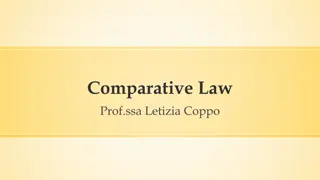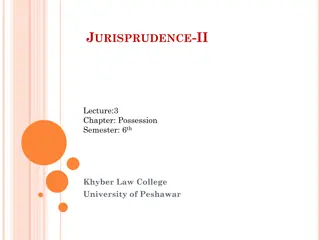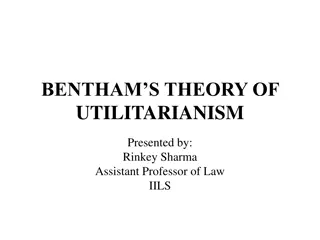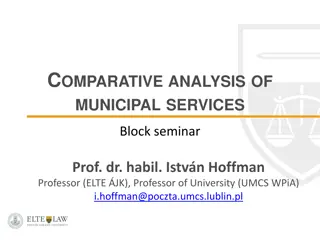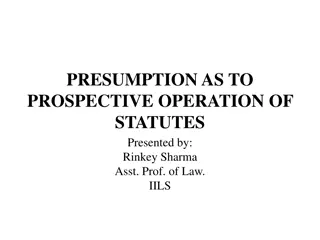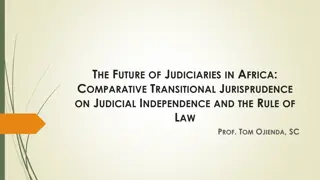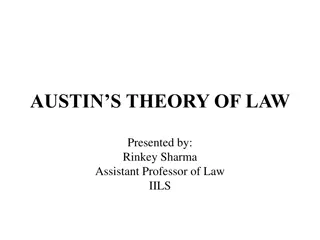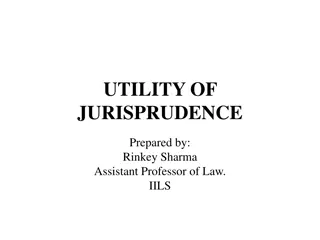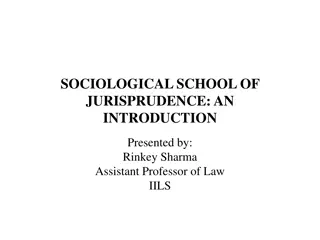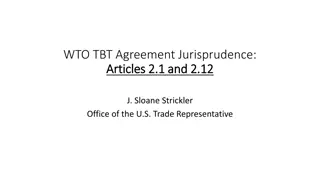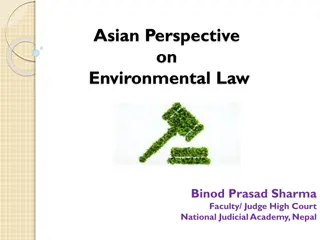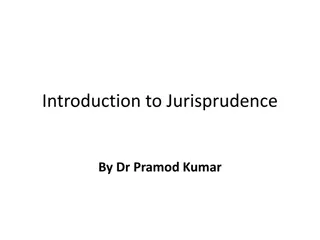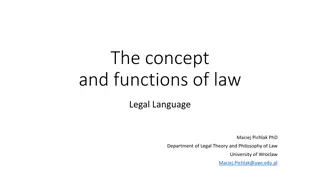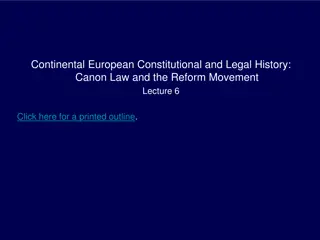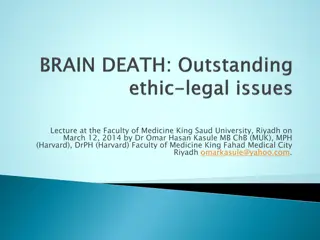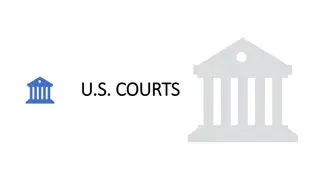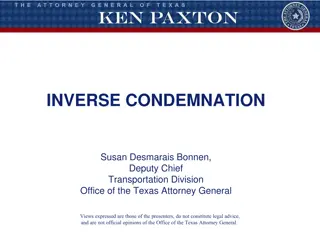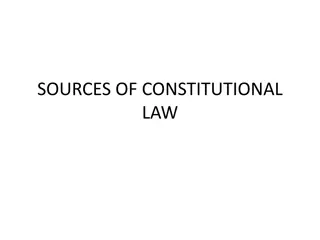Understanding Workplace Bullying and Harassment in Management
Workplace bullying and harassment in management are serious issues that can lead to psychological distress and organizational problems. This article discusses the emergence of the notion of harassment, different perspectives on its existence, management guides for businesses, legal definitions, and
5 views • 75 slides
Evolution of North American Law: From Common Law to Unique Legal Tradition
The historical origins of North American law trace back to the early 17th century, marked by the influence of English common law on the colonies. Over time, the American legal system evolved, absorbing elements from both the English legal tradition and local statutes. The development of the United S
0 views • 19 slides
Understanding the Basic Concept of Human Rights in Modern Jurisprudence
Human rights are natural and inalienable, essential for human life, based on universal principles. The concept of human rights is both simple and complex, requiring societal development and political will for implementation. Rooted in natural law theory, human rights have evolved from natural law to
1 views • 24 slides
Austin's Theory of Law by Rinkey Sharma: An Overview
Austin's Theory of Law, presented by Rinkey Sharma, delves into the Imperative Theory of Law as proposed by Austin, known as the father of English jurisprudence. It explores General and Particular Jurisprudence, Austin's definition of law, and the elements of positive law, emphasizing the concepts o
0 views • 11 slides
Understanding Possession in Jurisprudence
Possession in jurisprudence is defined as the closest relationship between a person and a thing they possess. It involves physical control and the intention to exercise that control. Various legal scholars have provided definitions to explain the concept of possession, highlighting the significance
0 views • 19 slides
Understanding Bentham's Utilitarianism Theory
Jeremy Bentham, often considered the father of Analytical School of Jurisprudence, introduced Utilitarianism as a guiding principle for law. According to Bentham, the purpose of law is to maximize the overall happiness and minimize pain for the greatest number of people. He developed the concept of
1 views • 7 slides
Comparative Analysis of Municipal Services in Public Sector Evolution
Explore the evolution and role of public services in the municipal sector through a comparative analysis presented in a block seminar by Prof. István Hoffman. Delve into the general theory of public services, the traditional and changing approaches of public administration, and government expenditu
0 views • 74 slides
Principles of Prospective Operation of Statutes in Legislation
Jurisprudence upholds the rule against retrospective legislation to protect settled matters and individual rights. The presumption is that laws should be prospective to avoid disrupting existing legal relationships. However, legislatures possess the power to enact retrospective laws, subject to cert
0 views • 16 slides
Understanding Fiqh: Schools, Sources, and Concepts in Islamic Jurisprudence
Fiqh, an Arabic term meaning "deep understanding," plays a crucial role in interpreting divine law (Shariah) in Islam. This article delves into the concept of Fiqh, the emergence of Fiqh schools, sources of Fiqh according to Imam Abu Haneefa, and different types of Fiqh. By exploring these aspects,
1 views • 11 slides
The Future of Judiciaries in Africa: Comparative Transitional Jurisprudence
Judicial independence in Africa is crucial for upholding the rule of law and fostering economic growth. This article explores the key aspects of judicial independence, the challenges faced in implementing it, and the impact on governance and human rights. Countries in transition, such as Kenya, are
0 views • 25 slides
Austin's Theory of Law in Jurisprudence
Austin's Imperative Theory of Law, presented by Assistant Professor Rinkey Sharma, delves into the foundational concepts of English jurisprudence as formulated by Austin. His work categorizes jurisprudence into general and particular aspects, exploring principles common to various legal systems and
0 views • 11 slides
Significance and Utility of Jurisprudence in the Legal Field
Jurisprudence plays a crucial role in scholarship, research, and the development of society by enhancing legal, political, and social thinking. It aids in clarifying legal concepts, promoting logical analysis, and guiding lawyers and judges in interpreting laws effectively. Through jurisprudence, in
1 views • 4 slides
Sociological School of Jurisprudence: An Introduction
Sociology studies human relations within society while jurisprudence focuses on law. The Sociological School of Jurisprudence emphasizes the interconnection between law and society. It emerged in response to the doctrine of Laissez Faire during the Industrial Revolution, advocating for a balance bet
1 views • 6 slides
Personal Rights in European Climate Litigation
Climate litigation in Europe focuses on individual rights and the shortcomings of traditional governance mechanisms in addressing climate change. The emergence of climate litigation as a crucial tool in governance is driven by the need to protect individuals and specific groups who are disproportion
0 views • 17 slides
WTO TBT Agreement Jurisprudence: Understanding Article 2.1 and 2.12
The WTO TBT Agreement's Articles 2.1 and 2.12 focus on ensuring non-discriminatory treatment for imported products compared to domestic and other countries' products. Article 2.1 emphasizes the concept of "like products" and examines competitive relationships between them to determine if they receiv
0 views • 22 slides
Perspectives on Environmental Law in South Asia
The judiciary in South Asian countries like India, Pakistan, and Bangladesh plays a vital role in upholding environmental justice and promoting sustainable development. These judiciaries have interpreted constitutional rights to include a healthy environment, leading to landmark decisions that integ
0 views • 15 slides
Understanding Jurisprudence: Law, Philosophy, and Science Explored
Explore the essence of jurisprudence through the intertwined realms of law, philosophy, and science. Delve into the meanings, key terms, and types of law, from natural to man-made, to understand the wisdom, knowledge, and regulations that govern human behavior in society.
0 views • 24 slides
Understanding the Concept and Functions of Law
Explore the profound impact of law on society through the lenses of legal language, social functions, and the multi-layered system of jurisprudence. Delve into the purpose of law, its role in guiding human conduct, and its importance in maintaining order and peace. Gain insights into the various fun
0 views • 14 slides
Overview of Canonical Collections in Continental European Constitutional and Legal History
The lecture delves into the influence of canon law and the reform movement on the development of legitimacy and governance in the 11th century, shaping the concept of the rule of law in the Western world. It discusses early Church canons, canonical collections such as Dionysiana and Hispana, and the
0 views • 42 slides
Ethical Issues in Brain Death Assessment: Practical Implications
The scenarios described raise complex ethical dilemmas surrounding brain death assessment and end-of-life care, involving critical decisions on life support continuation, organ donation, and family considerations. Analyzing these situations through the lens of Islamic law and principles of jurisprud
0 views • 12 slides
Insights on GST Jurisprudence Relevant Cases
Explore significant judgments like State of Maharashtra v. Suresh Trading Company and UOI v. Bharti Airtel Ltd. highlighting the importance of relying on registration certificates, the doctrine of "Lex non Cogit Ad impossibilia", and the self-assessment obligations under the GST Act. These cases emp
0 views • 14 slides
Understanding the U.S. Court System: Jurisprudence and Structure
Law enforcement officers play a crucial role in the criminal justice system by understanding criminal jurisprudence and the court system's structure. This includes knowledge of different court levels, jurisdiction, and the adjudication process. The duality of courts, such as adult vs. juvenile court
0 views • 43 slides
Understanding Inverse Condemnation: Legal Aspects and Case Studies
Explore the concepts of inverse condemnation, Serbonian Bog references, and the legal implications in Texas jurisprudence. Learn about typical and atypical claims, challenges faced by plaintiffs and defendants, and notable cases such as Harris Cty. Flood Control Dist. v. Kerr. Delve into government
0 views • 21 slides
Understanding the Sources of Constitutional Law
Explore the various sources of constitutional law, including legal basis, formal sources of law, values influencing norms, and the role of jurisprudence. Delve into concepts like Hans Kelsen's method of creating law, the origin of constitutional law, and the factors influencing it. Discover how diff
0 views • 11 slides
The Military's Domestic Role: History and Legal Framework
Explore the historic fear of domestic military use in Anglo-American jurisprudence, the significance of state-based National Guard units, and the implications of acts like Posse Comitatus Act and 18 U.S. Code 1385. Delve into legal cases like Bissonette v. Haig and insights on civil actions post suc
0 views • 26 slides
Seeking Improved Patent Eligibility in the US
The patent eligibility jurisprudence in the United States is described as a mess, impacting crucial future technologies. This article delves into the history of patent laws, Congressional intent, and the challenges faced since 1952, urging a reevaluation and improvement in the patent eligibility cri
0 views • 15 slides

